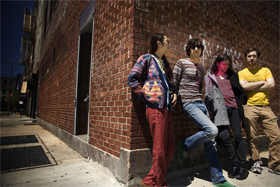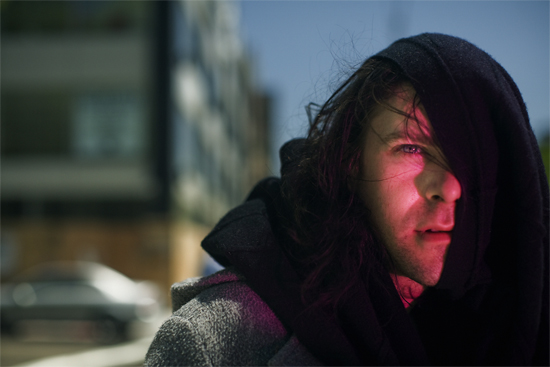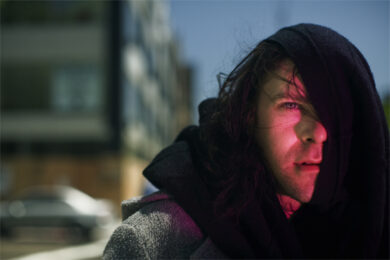I first spy Ariel Pink from across the street, lurking outside his record company offices and smoking the shit out of a roll-up before his next appointment with the music press. Pushed skyward on platform shoes, lank hair framing a pale face with surprisingly sharp, piercing eyes, he has something that it doesn’t quite feel accurate to call star quality, but – huh? Yeah, an aura. Ariel Pink has an aura. And I’m no expert in these things, but I’m willing to bet that not a lot of people out there have an aura quite the same shade as his.
Ariel Pink has been on the international radar since 2004, when his album The Doldrums received a reissue on Animal Collective’s Paw Tracks imprint after Ariel slipped the band a copy after a show. His early statements, taped to cassette at his home in Pico-Robertson, Los Angeles, took the qualities of DIY recording and turned them into a virtue, ambitiously melodic, but with tunes submerged in lo-fidelity scuzz and song structure routed with weird, illogical twists and turns.
Truth be told, a lot of Ariel’s early music is fascinating, but often it’s music to admire, rather than to really enjoy; the last five years has seen him languish in relative obscurity, even as a procession of so-called chillwave artists have seized on his recording aesthetic and dragged it into more simple, saleable realms.
But Pink’s new album, recorded for the first time with a full Haunted Graffiti band, feels like a breakthrough of sorts; if you have listened to his music before and admired it, rather than actively enjoyed it, it is time to try again. There is the ‘Round And Round’, elegiac drive-time pop from the parallel dimension just up and left from ours. ‘Butthouse Blondies’, monastic ‘60s psyche-rock with a huge, Clapton-esque guitar dynamic. ‘Hot Body Rub’, a mind-meld of white funk and Can circa Future Days that finds Ariel inviting you into his hot tub before revealing the unpleasantness that lurks within. ("Get a disease! Uh – spread it in grease!”) And the bizarre ‘Menopause Man’, where he sings of wanting to be a woman not for the glamour or the looks, but for the periods and child-bearing capacity. "Rape me, castrate me, make me gay,” he sings, "Lady I’m a lady from today.”
We take our seats in a nearby pub, and in conversation, as in music, Ariel is brilliant but erratic, ricocheting through topics including art, Satanism, success and the wonder of his hometown, Los Angeles.
Listen: download ‘Round And Round’ by Ariel Pink here
So, Before Today marks a new phase in Ariel Pink – it’s the first you’ve recorded backed by a full Haunted Graffiti band, for instance.
Ariel Pink: I was drifting in the live setting – that’s why I initially got the band together, for the purpose of having a legitimate band to play live. It was the means to an end. But I had to start taking things seriously. It means we’ve been able to play the past few years in a semi-coherent fashion, and it’s opened up a lot of doors. I don’t think 4AD ever had it in their mind to sign me as a solo artist, but the band was a kind of show of direction, the sign for them what I’m doing is a long-term thing. You know, if that can sustain itself.
It must have been nerve-wracking, taking your music out of the studio and onto the stage for the first time.
AP: But I like to go out of my comfort zone, that’s part of being an experimental artist. Thrusting myself into that arena after eight years of being a bedroom musician – I was more than happy to do it, but of course I had no idea what I was doing. I had to learn through slow and painful steps – one thing at a time, one foot in front of the other. You make a whole new impression on people, and I never had to deal with impressions when I was just recording. But for me it’s like a welcome challenge, it’s a new chapter. Now I’m taking care of the live thing, I feel really invigorated by the prospect of playing live music.
What were you like as a kid?
AP: I was very creative. I got kind of treated by my parents. When I was three I had really good painting abilities, apparently. That was noticed, and at the time I bought it – like, I could be Picasso!
The first time someone tells you you’re good at something, that makes an impression.
AP: I knew that I had an instinct for it, I believed what my parents said. But I wasn’t recognised for any innate musical abilities, and my doing that was seen as a rebellious phase. You know, I was supposed to be a great graphic artist, so I could work for Sony, or some fucking car company. But as an artist, I never felt like I had that in my sights. I had a really active inner life and I wrote stories. I had a feel for drama, for theatre, and I was in school plays. I played Adam in the Adam and Eve play, alongside my elementary school sweetheart, the girl I had the biggest crush on.
And I got to play Axl Rose in my school talent show. My mom showed up, I told her not to, but she showed up, and she was mortified to see me like that. My dad ended up spanking me. I was really young. They’re very normal people, my parents – they don’t know about my musical pursuits and my lifestyle, that’s always been hidden from view. I forged my creative life behind a locked door.
I was sent to therapists when I was very young. For being a weirdo, probably. But I really liked working with a therapist, because I realised it wasn’t all me, it was them. You know, we’re all kids in the world. It helped me get over having any grudges, just getting on with what I wanted to do.
Therapy is still seen as being quite unusual in this part of the world.
AP: I think it’s getting more unusual without the augmentation of things prescribed along with it. And I’m doctor-phobic. I should probably see a doctor about that.
Do you like living in Los Angeles? Obviously it’s one of the world’s biggest entertainment centres, and turns out a huge amount of cultural product – does that shape how you approach things aesthetically? Do you sort of grow up in the shadows of something like that?
AP: You learnt that it’s all bullshit from such a young age. That it doesn’t impress you. I know people who are not from LA, you know people who come over from Latvia or whatever, and you can just spot them a mile off. But [changes subject abruptly] … we invented TV, man! I’m surprised that everyone isn’t here. I feel like people make excuses in their minds for why they’re not in Los Angeles. People think it’s very plastic, but that seems like a very plastic sensibility to me, thinking something’s plastic. I eat up culture around me, and I’m still as star-struck as anybody when it comes to my heroes.
LA is in the business of making a narrative for performers, actors, entertainers. You know, the Hollywood story. You finally make it to Union Station, get off the train with a backpack and you’re off into the great wide open. The reality of LA is that there’s all these people dying for the same thing. People grow weary of the whole machine, but it’s there for a reason – for quality control. But for me, it’s the people who stay in LA and get through that barrier – you know, it doesn’t matter if they have a career or not, but they learn to exist there – those people are what LA is all about. It’s a dark place, a great place – it’s the most amazing city in my opinion.
I find Los Angeles very strange. I think it’s because it’s a profoundly un-European city, the scale, the shape, the culture…
AP: But the world is going the way of Los Angeles. Wholefoods, Gypsy boots, smoking bans, health food – all that stuff is Californian. We’re on the forefront, we provide the future and we broadcast it to the world. I’m proud to be there because there seems to be such a strange stigma about it, and it makes me proud to be from this place, it’s like having a soccer team. Johnny Rotten lives in LA. Morrisey. Who wouldn’t want to be there? It’s a place where people can be themselves, and live comfortably and build their glass towers. And they can do it in a way that’s more honest than that of the politicians or the East Coast nobility. LA is the new world… and maybe it’s terrible, maybe it’s a total agent of destruction, but that’s the way of the world, that’s the human race.
Would you live differently if you were a multimillionaire?
AP: I think so. I would be able to relax a little bit more. I wouldn’t have to work so hard, I’d probably loosen up a lot more. As it is I have to work for every penny that I make. I’m kinda the manager of my own company, so I have to make sure things run smoothly. It’s very easy for me to just disappear. If I don’t put in the work, I’m already forgotten. I have to scream to get people to pay attention to me. It doesn’t buy me anything to be in the newspapers. It’s free, it’s like prostitution. Eventually I’d like to retire. Is that so wrong?
Eventually?
AP: Eventually. I know I’m going about it in a bumbling half-assed way. It’s fun for me to go about it in this way. It’s a fun trajectory.
Let’s talk about nostalgia. I don’t think your music is strictly nostalgic – it has its own aesthetic qualities that make it immediately obvious as Ariel Pink music. But I wonder if you use aspects of nostalgia – and I wonder if nostalgia is a more complex quality than we’re led to believe?

AP: I think part of my appeal is that my music can be appreciated in many different ways. Nostalgia is like a contextual subplot – you can use it as an instrument. I’m not just a throwback. Any artist that’s had their music reviewed knows that critics will always find past records to compare it to – you know, like, The Warlocks get married to Kylie Minogue multiplied by The Flaming Lips with a cherry on top, or whatever. I’m not the first nostalgic artist out there. But – what are people talking about? All we have is the past. Stop looking so forward. It’s not nostalgia – it’s whatever it is you like in music. I just don’t want it to get watered down.
People are too happy in their roles. The quality stinks, man.
I wanted to talk about the cover of Before Today, because it’s pretty fascinating. You’re posed against the wall with the Haunted Graffiti band – but just around the corner, there’s, like, an illuminated old woman, facing away from the viewer. What is going on there?
AP: [Animated] It’s odd, isn’t it? It feels… cultish.
It reminds me of that horror film, Don’t Look Now – the final scene in Venice, with the figure in red.
AP: Right, he thinks it’s his dead daughter, the one in the red coat. [laughs]. And you know The Blair Witch Project, the girl in the corner with her back turned? You’re never supposed to see the back of someone’s head. It’s a very common filmic device, to show that something is not right. It’s absolutely sinister.
And she’s stood round the corner… you haven’t seen her yet.
But that’s a sign of things to come. [laughs] The signifiers here are very dense, but I believe that it’s all Satanic. I believe the act of writing itself is very Satanic. You know, the idea of consciousness, going back to the tree of knowledge, when Eve bit the apple… I believe that when you read The Bible, read those lines, you are Eve, and you have been duped by Satan. That’s what it is, man. All the symbolic stuff, the abstractions that we are so entrenched in, that we teach our children before they can even understand – it’s all entrenched in language.
So… language is the original sin?
AP: Yes. That’s exactly what I believe. Eve biting the apple is you reading these words and not knowing it. So [laughs] that’s the lady on the cover. Hold on, I gotta pee really quick.
[Ariel runs to the toilet. We reconvene in a beer garden]
AP: [Slightly suspiciously] I find writers can be so crazy. You know, writers report the facts from their point of view. People make me out to be crazier than I am.
Really?
AP: Yes. I’ve noticed.
Hmm, I guess it’s an angle.
AP: But it’s not reporting the facts. And they get to hide behind the anonymity. You never see the face of the writer. And writers are all alienated, lonely souls. It’s a thankless job.
Like a solo artist, maybe?
AP: Worse. I think it’s the loneliest job there is.
For me, interviewing is really interesting – it’s a way to learn about another’s artistic disposition. I mean, it’s really interesting to find out what makes people tick.
AP: If I knew how to write better, I would love to be a writer. I would love to write a book. You’re supposed to do that in every other field, before you graduate from college. But I work a lot better talking. Just philosophising.
Are you nervous about how you come across?
AP: No. I mean, I’m a nervous person by nature, in myself. But I feel normal. I feel like the most normal person. I feel like everyone else is crazy.
Hey, are you still working with [outsider artist] R. Stevie Moore?
AP: Mmhmm. We just played a live show together in New York. I stayed over at his place – I helped him out of bed, helped him get up and running. He’s got arthritis, but he’s not that old – 58 I think.
He’s obviously been an inspiration to you creatively – but I guess he’s also been an inspiration in terms of how to conduct yourself as an artist.
AP: As a person, he’s influenced me again in so many ways. Knowing him is such a… like, when I first met him, first made his acquaintance, it felt like I was talking to a God. You coulda shot me right then. He gave me a whole new purpose for a while. I wanted to keep his name, make sure people don’t forget it. I’ve kept on trying to bring focus back to him in a lot of ways. I’m very loyal to him.
How much time do you spend making music?
AP: Virtually none. All my time is spent rehearsing for live shows. When I’m not rehearsing, or playing live, I have a chance to do it. Putting out records on Paw Tracks was a good leg up for me, but they’re barely a label, so for the last couple of years, I‘ve just been trying to get signed. You know, originally I was thinking, like, Dreamworks. But nobody was coming around.
Before Today is out now on 4AD
Podcast: Play in new window | Download



